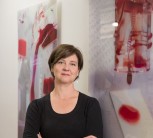Professor Lyn-Marie Birkholtz is a full professor in Biochemistry at the University of Pretoria (UP) and has been the South African Research Chair (SARChI) in Sustainable Malaria Control since 2013. She leads efforts to target malaria parasites to contribute to malaria elimination strategies. Her work recently led to the discovery of new chemical entities that have the potential to block malaria parasite transmission and aid malaria elimination strategies (Nature Communications, January 2021).
Prof Birkholtz did her BSc in Genetics, Human Physiology and Biochemistry, and her PhD in Biochemistry at UP (jointly performed in South Africa and Germany). This was followed by postdoctoral fellowships in Germany and the US. She leads the Parasite Cluster within the UP Institute for Sustainable Malaria Control.
“With key platforms like the UP Institute for Sustainable Malaria Control, the Genomics Institute and continuous new developments – for example, under a One Health sphere with transdisciplinary research – UP is perfectly positioned for our research focus,” she says.
Prof Birkholtz is principal investigator of the Malaria Parasite Molecular Laboratory, and has a keen interest in the fundamental processes that drive parasitism and how this sustains global health challenges. She hopes to translate her research outcomes into meaningful, tangible health innovations, particularly to discover new antimalarial drugs.
Her research group works at the interface of parasite biology and drug discovery, and uses new biological insights as a catalyst for drug discovery. They do this by obtaining an in-depth understanding of the essential processes that drive the survival and pathogenesis of malaria parasites; this is a substantial research challenge that they approach from a systems level.
Prof Birkholtz’s work focuses on the pathogenic processes that drive the proliferation and differentiation of malaria parasites to deliver drugs that are able to target both these forms of the parasite. In line with international endeavours to achieve malaria elimination, her research uses high-content biological information of malaria parasites to support sustained discovery of malaria control chemotherapies in order to contribute to the global Malaria Eradication Research Agenda.
The Parasite Cluster of the UP Institute for Sustainable Malaria Control is a transdisciplinary research entity that spans all 11 UP faculties. Prof Birkholtz works closely with various experts in several faculties, specifically driving projects between the Natural and Agricultural Sciences and Health Sciences faculties.
Internationally, she leads the transdisciplinary Community of Practice (CoP), which brings researchers across South Africa, Africa and the world together to evaluate malaria elimination innovations. “As a group, we work directly with external stakeholders, such as provincial and government-level malaria control programmes and international bodies, including the World Health Organisation and Medicines for Malaria Venture,” the professor explains. “This allows for meaningful translation of our work. The CoP synergised the work by six SARChI Chairs from UP, Stellenbosch University, the University of Cape Town [UCT] and Wits University, allowing for an extraordinary opportunity for cooperation in South Africa.”
A recent milestone for Prof Birkholtz was the delivery of chemical entities that are able to kill malaria parasites, but specifically, able to kill multiple forms of malaria parasites including the elusive transmissible forms. This discovery was part of a long-standing collaboration between UP, Wits, UCT and the Council for Scientific and Industrial Research. “We are building on this discovery by further profiling and developing these transmission-blocking entities through a Grand Challenges Africa grant, awarded by the Bill & Melinda Gates Foundation and managed by the Alliance for Accelerating Excellence in Science in Africa and the African Academy of Sciences,” she says.
Prof Birkholtz is a National Research Foundation B2-rated scientist and was recognised by UP as an Exceptional Young Researcher in 2010 and 2013, and as an Exceptional Academic Achiever between 2019 and 2021. She received the Vice-Chancellor’s Exceptional Supervisor Award and the National Science and Technology Forum’s Science Communication Award in 2018. She is also an elected member of the Academy of Science of South Africa.
Prof Birkholtz is passionate about training the next generation of young scientists in the cutting-edge technologies used in her programme. To date, 19 PhD and 30 master’s students have worked under her (co)-supervision, with several graduates having been awarded international fellowships.
More from this Researcher

 Story
Story
 Infographic
Infographic
 Story
Story
Get Social With Us
Download the UP Mobile App